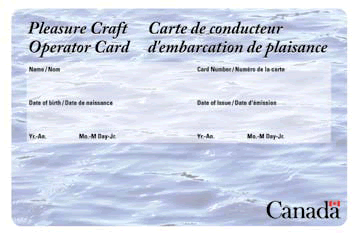 In Canada, operating a private motorboat requires having a Pleasure Craft Operator’s Card. Now, after you get over chuckling about which bureaucrat made up the term, the basic principle is quite sound. If you are running a boat with a motor, you need to get this competency card. I’m proud to say I’m the holder of such a card to use my Chaparral motorboat during the summer. Getting my operator’s card required passing an exam that took about 45 minutes and required little study for me as I’ve been in and around boats since I was a child and had a father who made sure that no one operated a boat he was on without knowing the navigation rules.
In Canada, operating a private motorboat requires having a Pleasure Craft Operator’s Card. Now, after you get over chuckling about which bureaucrat made up the term, the basic principle is quite sound. If you are running a boat with a motor, you need to get this competency card. I’m proud to say I’m the holder of such a card to use my Chaparral motorboat during the summer. Getting my operator’s card required passing an exam that took about 45 minutes and required little study for me as I’ve been in and around boats since I was a child and had a father who made sure that no one operated a boat he was on without knowing the navigation rules.
That’s fine for my 8 person boat but what about larger craft? The top license available is called a Master Mariner and it comes in a variety of flavors but the most advanced license available is called “Master Mariner, Any Gross Tonnage”, Oceans or otherwise known as “Unlimited Master Mariner”. For anyone who has taken a cruise, it’s often surprising to find out the person in charge of the cruise ship is properly referred to as the ship’s master though pretty much everywhere we say “Captain” all the same. Becoming a Master Mariner takes at least five years of highly structured training and apprenticeship. It’ll be longer to become a Master Mariner, Any Tonnage and longer still to become a Master Mariner, Any Tonnage, Oceans.
Hold on, if you’re about to tune out. I’m getting to the project management part now.
We have these well-defined structured training to let someone take charge of a large ship and sail it safely from Point A to Point B but we are much less certain of what is meant by a “Project Manager”. Despite project management having been around since the dawn of time and project manager as a career, having been around at least several decades, we are not much closer to a common understanding of how to tell one project manager from another.
When I started in the industry, project managers were thought of more in the construction and engineering industries. Those who could handle a project of “any tonnage, anywhere” were small in number and legendary. These were the people you went to for the next Olympics or the next mega skyscraper. Those folks are still around and people have apprenticed with them as a new breed of project managers coming forward. But, in so many industries it is harder to get a handle on who can manage what kind of project.
In the past few years I’ve noticed a disturbing trend among project managers in association dinners and events I’ve attended. There is a significant proportion of us who are more focused on our career opportunities than learning what we need to know next to take on the next sized project. I see people on LinkedIn and working in project associations who are all about their resume and “spinning” their experience and not much about how much they know.
We’ve had the opportunity at HMS to interview people in the project management industry in the last couple of years and the results concern me. A high percentage of those resumes I reviewed looked great and when meeting the people attached to those resumes, I asked more about their experience and what their actual responsibilities were on the projects they spoke of so highly. Sadly, a high percentage of those people interviewed seemed to have learned very little and their actual experience was more as a project operator or functionary rather than as someone who could guide a project through a tough time.
Perhaps as our industry evolves we’ll find ourselves focusing more on longer term project training rather than the weekend courses and tests that seem so popular. I, for one, would be delighted to find some international standards that are universally accepted for a master project manager that, just like those who take charge of ships at sea, include both theoretical tests and in-the-field experience.
There are numerous project certifications that are the equivalent of my Pleasure Craft Operators Card. Mine took a few hours of study and testing and was accomplished over a weekend. I hope one day soon we’ll see the project equivalent of a Master Mariner, Any Tonnage, Oceans.



